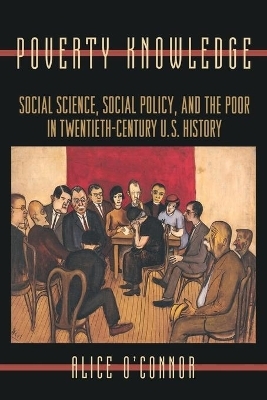
Poverty Knowledge
Princeton University Press (Verlag)
978-0-691-10255-9 (ISBN)
Progressive-era "poverty warriors" cast poverty in America as a problem of unemployment, low wages, labor exploitation, and political disfranchisement. In the 1990s, policy specialists made "dependency" the issue and crafted incentives to get people off welfare. Poverty Knowledge gives the first comprehensive historical account of the thinking behind these very different views of "the poverty problem," in a century-spanning inquiry into the politics, institutions, ideologies, and social science that shaped poverty research and policy. Alice O'Connor chronicles a transformation in the study of poverty, from a reform-minded inquiry into the political economy of industrial capitalism to a detached, highly technical analysis of the demographic and behavioral characteristics of the poor. Along the way, she uncovers the origins of several controversial concepts, including the "culture of poverty" and the "underclass."
She shows how such notions emerged not only from trends within the social sciences, but from the central preoccupations of twentieth-century American liberalism: economic growth, the Cold War against communism, the changing fortunes of the welfare state, and the enduring racial divide. The book details important changes in the politics and organization as well as the substance of poverty knowledge. Tracing the genesis of a still-thriving poverty research industry from its roots in the War on Poverty, it demonstrates how research agendas were subsequently influenced by an emerging obsession with welfare reform. Over the course of the twentieth century, O'Connor shows, the study of poverty became more about altering individual behavior and less about addressing structural inequality. The consequences of this steady narrowing of focus came to the fore in the 1990s, when the nation's leading poverty experts helped to end "welfare as we know it." O'Connor shows just how far they had traveled from their field's original aims.
Alice O'Connor was formerly the Assistant Director of the Project on Social Welfare and the American Future at the Ford Foundation, the Director for the Programs on Persistent Urban Poverty and International Migration at the Social Science Research Council, a National Science Foundation Postdoctoral Fellow at the University of Chicago, and a Visiting Scholar at the Russell Sage Foundation. She is currently Associate Professor of History at the University of California, Santa Barbara.
Acknowledgments ix Introduction 3 PART ONE 23 Chapter 1. Origins: Poverty and Social Science in The Era of Progressive Reform 25 Chapter 2. Poverty Knowledge as Cultural Critique: The Great Depression 55 Chapter 3. From the Deep South to the Dark Ghetto: Poverty Knowledge, Racial Liberalism, and Cultural "Pathology" 74 Chapter 4. Giving Birth to a "Culture of Poverty": Poverty Knowledge in Postwar Behavioral Science, Culture, and Ideology 99 Chapter 5. Community Action 124 PART TWO 137 Chapter 6. In the Midst of Plenty: The Political Economy of Poverty in the Affluent Society 139 Chapter 7. Fighting Poverty with Knowledge: The Office of Economic Opportunity and the Analytic Revolution in Government 166 Chapter 8. Poverty's Culture Wars 196 PART THREE 211 Chapter 9. The Poverty Research Industry 213 Chapter 10. Dependency, the "Underclass," and a New Welfare "Consensus": Poverty Knowledge for a Post-Liberal, Postindustrial Era 242 Chapter 11. The End of Welfare and the Case for a New Poverty Knowledge 284 Notes 297 Index 359
| Erscheint lt. Verlag | 1.9.2002 |
|---|---|
| Reihe/Serie | Politics and Society in Modern America |
| Verlagsort | New Jersey |
| Sprache | englisch |
| Maße | 152 x 235 mm |
| Gewicht | 567 g |
| Themenwelt | Geisteswissenschaften ► Geschichte ► Regional- / Ländergeschichte |
| Geschichte ► Teilgebiete der Geschichte ► Kulturgeschichte | |
| Sozialwissenschaften ► Soziologie | |
| ISBN-10 | 0-691-10255-4 / 0691102554 |
| ISBN-13 | 978-0-691-10255-9 / 9780691102559 |
| Zustand | Neuware |
| Haben Sie eine Frage zum Produkt? |
aus dem Bereich


